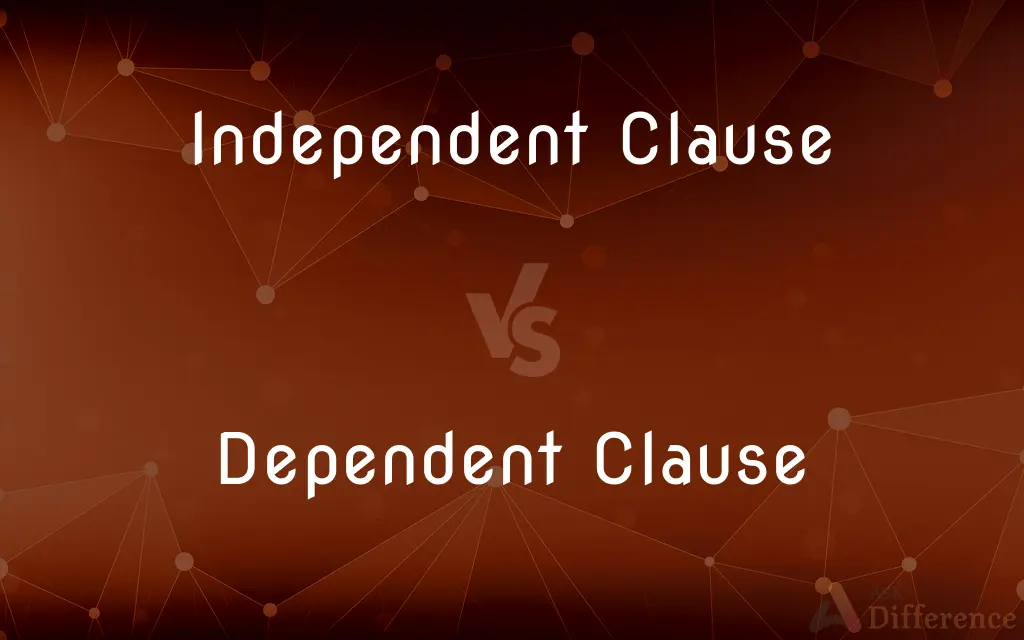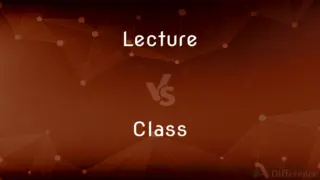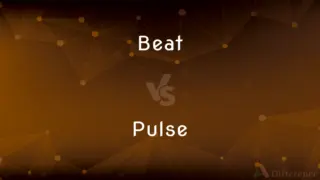Independent Clause vs. Dependent Clause — What's the Difference?
By Tayyaba Rehman — Published on October 10, 2023
An Independent Clause expresses a complete thought and can stand alone; a Dependent Clause doesn't express a complete thought and cannot stand alone. Distinctively, completeness and stand-alone ability differentiate them.

Difference Between Independent Clause and Dependent Clause
Table of Contents
ADVERTISEMENT
Key Differences
An Independent Clause embodies a subject and a verb and conveys a complete thought, enabling it to stand alone as a sentence. On the other hand, a Dependent Clause, while also possessing a subject and a verb, fails to express a comprehensive idea, prohibiting its solitary use in communication, thereby being reliant on an Independent Clause.
Independent Clauses serve as foundational structures in sentence construction, possessing the potential to be sentences themselves. Conversely, Dependent Clauses inherently require the support of an Independent Clause to confer coherent and complete information, as their stand-alone usage would result in a fragment.
Utilizing conjunctions, Independent Clauses can be seamlessly linked with each other, forming compound sentences that still preserve the integrity and clarity of ideas. Dependent Clauses employ subordinating conjunctions or relative pronouns, tethering themselves to Independent Clauses, ensuring their incomplete thoughts find resolution and clarity through combination.
Independent Clauses, by virtue of their self-sufficiency, find prevalent use across various sentence types - declarative, interrogative, imperative, and exclamatory. In stark contrast, Dependent Clauses, laden with their intrinsic reliance on completion from an Independent Clause, navigate within complex and compound-complex sentences, enriching them with additional, albeit incomplete, information.
In syntactical constructions, Independent Clauses effortlessly take on the role of main clauses. The Dependent Clause, however, always leans into its supportive role, complementing, explaining, or providing context to the main clause, facilitating nuanced and layered communication.
ADVERTISEMENT
Comparison Chart
Completeness of Thought
Expresses a complete thought.
Doesn't express a complete thought.
Stand-alone Ability
Can stand alone as a sentence.
Cannot stand alone as a sentence.
Utilization in Sentence Types
Used in various sentence types.
Typically used in complex sentences.
Conjunction Usage
Uses coordinating conjunctions.
Uses subordinating conjunctions or relative pronouns.
Function in Sentences
Serves as main clauses.
Acts as supportive information to main clauses.
Compare with Definitions
Independent Clause
Independent Clauses can function as standalone sentences.
The sun sets.
Dependent Clause
Dependent Clauses add extra information to main clauses.
Wherever you go.
Independent Clause
An Independent Clause conveys a complete thought.
She dances gracefully.
Dependent Clause
Dependent Clauses contain a subject and a predicate but lack completeness.
Unless it rains.
Independent Clause
Independent Clauses can be any type of sentence (declarative, interrogative, etc.)
Is that your book?
Dependent Clause
Dependent Clauses cannot stand alone as sentences.
While the clock ticked.
Independent Clause
Independent Clauses contain a subject and a predicate.
The train arrived.
Dependent Clause
Dependent Clauses use subordinating conjunctions.
Because he was tired.
Independent Clause
Independent Clauses can connect with coordinating conjunctions.
She laughed, and he smiled.
Dependent Clause
A Dependent Clause doesn't present a complete thought.
Although she was late.
Common Curiosities
Is a Dependent Clause incomplete in meaning?
Yes, it doesn’t convey a complete thought alone.
Is it correct to say Independent Clauses are always sentences?
They can be, but aren’t always standalone sentences.
What does a Dependent Clause typically start with?
A subordinating conjunction or a relative pronoun.
Can an Independent Clause stand alone?
Yes, it expresses a complete thought and can be a sentence.
Can a sentence have multiple Independent Clauses?
Yes, connected with coordinating conjunctions or punctuation.
Can a Dependent Clause be located at the beginning of a sentence?
Yes, it can precede or follow an Independent Clause.
Are Independent Clauses and main clauses synonymous?
Often, but main clauses may contain dependent elements.
Do Dependent Clauses enrich sentences?
Yes, by providing additional context or information.
Can you join two Independent Clauses with a comma?
Yes, but a coordinating conjunction is also needed.
Are Dependent Clauses also known as subordinate clauses?
Yes, both terms are used interchangeably.
Is an Independent Clause always followed by a Dependent Clause?
No, it can stand alone or be part of a compound sentence.
Does a Dependent Clause need an Independent Clause?
Yes, to form a complete and coherent sentence.
Can an Independent Clause start with "because"?
Typically, no. “Because” usually introduces Dependent Clauses.
Can you provide an example of a subordinating conjunction?
Certainly, examples include "although," "because," and "since."
Can Dependent and Independent Clauses form complex sentences?
Yes, Independent Clauses and Dependent Clauses commonly form complex sentences.
Share Your Discovery

Previous Comparison
Lecture vs. Class
Next Comparison
Beat vs. PulseAuthor Spotlight
Written by
Tayyaba RehmanTayyaba Rehman is a distinguished writer, currently serving as a primary contributor to askdifference.com. As a researcher in semantics and etymology, Tayyaba's passion for the complexity of languages and their distinctions has found a perfect home on the platform. Tayyaba delves into the intricacies of language, distinguishing between commonly confused words and phrases, thereby providing clarity for readers worldwide.
















































